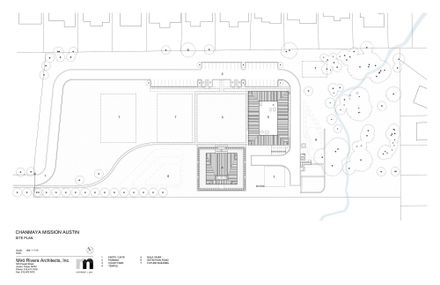
Chinmaya Mission Austin
ARCHITECTS
Miró Rivera Architects
SPECIALTY METAL WORK
Metalink Corporation
MEP ENGINEER
Bay & Associates
GENERAL CONTRACTOR
Spawglass
LANDSCAPE
Studio Dwg
ACCESSIBILITY
The Access Partnership
ARCHITECT IN CHARGE
Juan Miró, Miguel Rivera
PROJECT MANAGER
Ken Jones
STRUCTURAL ENGINEER
Architectural Engineers Collaborative
CIVIL ENGINEER
Aupperle Company
MANUFACTURERS
Ceco Door, Contrast Lighting, Lighting Services, Mermet, Moderco, Tivoli
TEAM MEMBERS
Spencer Cook,
Bud Franck, Matthew Helveston, Michael Hsu,
Shane Pavonetti, Edward Richardson
YEAR
2014
LOCATION
Austin, United States
CATEGORY
Worship
Text description provided by architect.
Established as a home for the Central Texas division of Chinmaya Mission, an international non-profit Hindu spiritual organization, this new 8-acre campus is characterized by an architectural language that reinterprets traditional Indian typologies in order to reflect the organization’s modern context.
Presented with the unique opportunity of designing a Hindu mission in Central Texas, the architects applied their knowledge of local building materials to create a visual language that is rich in texture, sculptural in quality, and innovative in design.
The main challenge of the project was two-fold: to create spaces that accommodated both the spiritual and practical needs of the rapidly-growing mission, and to apply established Hindu practices in ways that felt new and unexpected.
The campus master plan combines the traditional vastu shastra principles of Hindu design—emphasizing geometric patterns, symmetry, and directional alignments—with a contemporary sensibility. The completed first phase consists of a temple and Bala Vihar (educational building) arranged around a central lawn, with space reserved for future buildings.
Working within the restrictive budget of a non-profit organization, design was not sacrificed; rather, it inspired the design team to find a vocabulary that was simple yet refined. In elevation, white stucco walls and pitched roofs recall traditional
Indian typologies; large windows provide abundant natural light in every occupied space; and deep overhangs offer refuge from the hot Texas sun. By simply alternating the tones of the standing seam metal roof panels, a striking design motif was conjured up from a commonplace material.
The most spectacular example of this creative adaptability is the airy steeple atop the temple’s peak. To reduce costly field-welding, the delicate structure was shop-fabricated using galvanized fencing material and then lifted into place.
Serving as the educational hub of the mission center, the Bala Vihar consists of 12 classrooms plus a central gallery and large covered patio for congregation and social events.
Flexibility was a major priority, as the facility must comfortably accommodate small weekly classes as well as special events. In response, three of the classrooms utilize operable partitions to create larger spaces as needed.
A central gallery plays multiple roles as circulation, display space, and assembly hall. At the temple, the prevalence of symmetry and geometry are reminders of traditional Hindu religious architecture.
Beginning in the central meditation hall and moving out toward the perimeter of locally-source limestone blocks, a series of concentric circles, squares, and rectangles—including an illuminated pattern in the meditation hall’s dramatically-sloped ceiling—references traditional mandala- inspired architecture.
Above the shrine, the most sacred space in the temple, light from concealed skylights is reflected by a golden wall, creating an aura around three deities arrayed with bright robes and flowers.
In its development and execution, the design of Chinmaya Mission Austin strikes a delicate balance between the need to respect both the traditional building methods of an ancient religion and the limited resources of a non-profit organization; and the desire to employ a contemporary aesthetic that reflects the forward-thinking approach of an international faith.




















